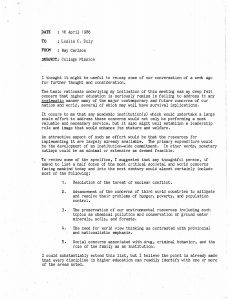Raymond Carlson was a faculty member in Bemidji State University’s psychology department beginning in the 1950s. In 1986, two years after he retired from Bemidji State, he drafted this memo to Les Duly, who at the time was BSU’s academic vice president. In the memo, he shares his belief that higher education, in general, could do more to address “major contemporary and future concerns of our nation and world.”
| • Ray Carlson memo to President Duly 1986 |
 |
A scanned copy of Carlson’s original memo and the full text of his message to President Duly are shared below courtesy of his granddaughter, Dr. Anna Carlson, an assistant professor in BSU’s Center for Sustainability Studies.
DATE: 16 April 1986
TO: Leslie C. Duly
FROM: Ray Carlson
SUBJECT: College Mission
I thought it might be useful to re-cap some of our conversation of a week ago for further thought and consideration.
The basic rationale underlying my initiation of this meeting was my deep felt concern that higher education is seriously remiss in failing to address in any systematic manner many of the major contemporary and future concerns of our nation and world, several of which may well have survival implications.
It occurs to me that any academic institution(s) which would undertake a large scale effort to address these concerns would not only be performing a most valuable and necessary service, but it also might well establish a leadership role and image that would enhance its stature and welfare.
An attractive aspect of such an effort would be that the resources for implementing it are largely already available. The primary expenditure would be the development of an institution-wide commitment. In other words, monetary outlays could be as minimal or extensive as deemed feasible.
To review some of the specifics, I suggested that any thoughtful person, if asked to list a half dozen of the most critical societal and world concerns facing mankind today and into the next century would almost certainly include most of the following:
- Resolution of the threat of nuclear conflict.
- Advancement of the concerns of third world countries to mitigate and resolve their problems of hunger, poverty, and population
control. - The preservation of our environmental resources including such topics as chemical pollution and conservation of ground water
minerals, soils, and forests. - The need for world view thinking as contrasted with provincial and nationalistic emphasis.
- Social concerns associated with drug, criminal behavior, and the role of the family as an institution.
I could substantially extend this list, but I believe the point is already made that every discipline in higher education can readily identify with one or more of the areas noted.
It is my belief that, for the most part, academia is responding to such concerns in a very fragmented and cursory manner. I strongly feel we can no longer afford the luxury of such intellectual detachment, that the issues cited are of such urgency that they must become points of focus and special emphasis within our curriculum and courses of study as well the subjects of forums and seminars.
I was somewhat surprised and most pleased to learn that Stanford University is one of a consortium of colleges and universities involved in deliberate, programmatic efforts to increase the social consciousness and concerns of their students. Dr. Kennedy, Stanford’s President, has been deeply committed to this emphasis. I am enclosing a couple items of information I received from their Office of Public Services.
While I applaud this effort, I see no reason for not expanding it to embrace other concerns. In other words, let’s start educating for the twenty-first century, not the 1970’s. Bemidji State is small, but with imagination and commitment we could become leaders in the midwest. It seems to me that such a reputation would attract students and external funding as tangible auxiliary benefits.
Finally, it is my view that the proposed emphases represent a valid extension of a true liberal education philosophy. Too often, we provide students the “liberating” foundations, but not the vehicles for implementing such principles and ideals.
Assuming your interest in such a thrust, the question of how best to proceed is a most vital one. Certainly, we would first need the full endorsement of all our top level administration. Ultimately we would need the same support from our faculty.
Your suggestion of getting grassroot soundings and input via an administration-faculty retreat seems very promising. I do not believe a hurried or crash effort would be productive. Considering the potential scope and all-institutional involvement, I would rather make haste slowly. The more people involved in a planning effort, the more productive would be the outcome. I would want every discipline and course of study included so that the program(s) would become integral aspects of what we are now doing — not just add-ons.
To get back to the “retreat” suggestion, I can already envision some plans and ideas for implementing it. However, I won’t dwell on those thoughts now. A final thought, I must acknowledge that some of my enthusiasm and optimism for this entire notion is my basic conviction that there is a well-spring of idealism and social concern in most of us, and particularly in our youth that we have been miserably failing to tap and nurture. An example of what can happen given the right leadership was the Peace Corps program. How much more promising are such efforts in contrast to our current national emphasis on militaristic domination and control!
I apologize a bit for the rather zealous tone of this letter, but I would hope that a little extra enthusiasm is merited. Without it we might just as well settle for greater computer proficiencies as our goal.
Encls.
